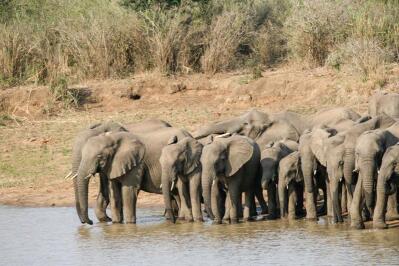KwaZulu-Natal’s ongoing human-wildlife conflict escalated, as Ezemvelo KZN Wildlife rangers culled five elephants after they broke through reserve barriers, posing severe dangers to northern KZN communities.
Following a worrying change in migration patterns, wildlife authorities in KZN have been forced to take drastic action, culling five elephants that breached reserve fences and ventured into human-populated areas, sparking intense debate on wildlife management and conservation strategies.
KwaZulu-Natal wildlife rangers have killed five elephants that broke through the fences of wildlife reserves and were “deemed an extreme risk to human life”.
The incident was confirmed by KZN wildlife authority, Ezemvelo, who on Monday warned of a new elephant threat to communities in northern KZN.
It comes after an unprecedented change of migration patterns that has seen elephants from Mozambique and regions such as Mpumalanga and Swaziland crossing into South African territory.
Ezemvelo KZN Wildlife said the potential dangers these animals pose to the human population was a concern.
The authority said that unlike the Tembe Elephant Park, which is equipped to contain elephants, Ndumo Game Reserve’s fencing is not designed for such enclosures, resulting in elephants easily moving into community lands, where they can cause significant crop and property damage, and pose severe risks to human safety.
“The situation has escalated in the past week, necessitating immediate action,” said Ezemvelo’s acting CEO, Sihle Mkhize.
“Our monitoring teams have seen a sudden increase in elephant movements into Ndumo, leading to close collaboration with stakeholders across borders to address this urgent issue.”
Efforts to drive the elephants back have not always been successful.
The five elephants that were recently killed had wandered 16 kilometres south into community areas, deemed an extreme risk to human life under the regulations of the National Environment Management Biodiversity Act.
Ezemvelo is engaging in rapid assessments to ascertain the number of elephants and the causes of this new migration pattern.
“Our priority is the safety of both the community and the elephants. However, there is a risk of rapid movement out of the reserve, which could escalate the threats to local residents,” Mkhize elaborated.
This incident is part of a larger trend of increasing human-wildlife conflicts in South Africa, with similar cases reported around Hluhluwe Imfolozi Park, Ithala Game Reserve, and Kruger National Park. Last year, an incident involving elephants from the Pongola Private Game Reserve highlighted the broader issue of managing human-elephant interactions in the country.
“We are dedicated to finding a sustainable resolution that protects both the communities and the wildlife,” Mkhize added.
Ezemvelo urges the public to report any elephant sightings and to keep a safe distance from these animals as they work towards a solution to manage and redirect the elephant herds effectively.
Heinz de Boer, the Democratic Alliance’s spokesperson for Economic Development, Tourism, and Environmental Affairs in KZN described the situation as a “crisis”.
He said South Africa was faced with a booming elephant population and a shrinking natural habitat.
“What we have here is a typical example of human-wildlife conflict. Simply put, these are massive animals, they consume a lot of vegetation and they can be quite destructive because they push down trees etc. And our natural game reserves don’t have the capacity or the area anymore to sustain large herds of elephants and obviously to relocate elephants. You have to relocate in most cases an entire herd.
“And it’s very, very difficult to actually find countries that will even want to take elephants, because there’s obviously the cost implications, the implications of transport, and the implications of guarding them against poachers,” he said.
De Boer said that there was a very strong concern among conservationists that not just KZN, but the whole of Africa could no longer sustain its elephant herds anymore.
“We need to start finding innovative ideas with international collaborations and other countries in which we can start putting together a worldwide kind of effort into relocating elephants … We have put up geographic borders that elephants have never respected. They can travel for hundreds of kilometres, because that is their natural tendency. We need to all come together, I think, as multiple countries, as Africa, and start finding solutions to where we can put the extra elephant that will continue to roam across Africa, whether we like it or not,” he said.
IOL News

